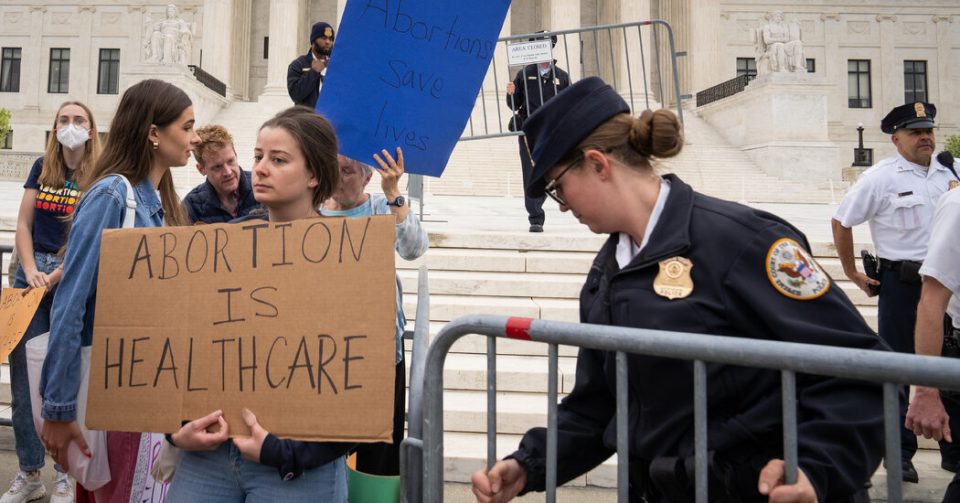(Want to get this newsletter in your inbox? Here’s the sign-up.)
Good evening. Here’s the latest at the end of Tuesday.
1. A draft opinion that leaked yesterday showed the Supreme Court preparing to strike down Roe v. Wade.
That would upend 50 years of settled law, leaving states to decide individually if women in the U.S. can get abortions. The court confirmed today that the draft, written by Justice Samuel Alito and leaked to Politico, is real but added that it did not represent “the final position of any member.” A final decision is expected sometime in June or early July.
Chuck Schumer, the Senate majority leader, reiterated his plans to bring legislation that would codify Roe v. Wade to the floor. But Senator Joe Manchin of West Virginia, who has opposed abortion rights legislation, said that he would not support undoing the filibuster to pass legislation. President Biden warned that overturning Roe v. Wade would jeopardize other rights.
Congressional Republicans celebrated with muted optimism while condemning the leak. Chief Justice John Roberts directed an investigation to begin.
In an analysis, our Supreme Court reporter Adam Liptak asks who benefits from the leak.
2. If Roe v. Wade were overturned, here’s what American women would face.
The typical abortion patient in the U.S. right now is low-income, unmarried, in her 20s and has a child already.
If a decision against Roe throws the issue to states, about half of them, located mostly in the South, Midwest or Great Plains, would probably ban or limit abortion. In 13 states, trigger laws would make abortion illegal immediately or very quickly after Roe is overturned. Fourteen more would be likely to ban or restrict it heavily.
In states that have already moved to ban or restrict abortion, medical abortions, using pills ordered online, have been a workaround — and the new focus in the nation’s five-decade debate over abortion rights.
In polls, Americans generally support abortion rights. Right now, around one in four American women is expected to obtain an abortion in her lifetime. If Roe were overturned, legal abortions would fall by at least 13 percent, according to one estimate. For a view of life before Roe, The Times’s Opinion section interviewed women who remembered it.
The three-day journey by bus took the evacuees to the relative safety of Ukraine-controlled territory, even as Russian forces bombarded targets across parts of the country’s south and east.
“I was in Azovstal for two and a half months, and they slammed us from all sides,” said Olga Savina, an older evacuee. She said the sun had burned her eyes after so many days underground.
In other Russia-Ukraine news, Western officials said that despite the war’s brutality, President Vladimir Putin of Russia appeared to be holding back, perhaps because of sheer incompetence.
4. Ohio’s Republican Senate primary is testing former President Trump’s influence on his party.
More so than many other contests, today’s heated election to replace Rob Portman, an establishment Republican who is retiring, will signal whether Republican voters have an appetite for hard-right, anti-establishment figures in Trump’s mold — or for only those with his seal of approval.
Indiana’s Republican primary also has implications for the party’s direction. More incumbents at the state level are facing primary challengers from the right than in at least a decade, according to a review by The Indianapolis Star, potentially resulting in an even more conservative legislative supermajority.
6. In Las Vegas, grass is outlawed — but not that kind.
In an attempt to save water, a new Nevada law requires that patches of grass found along streets, developments and commercial sites in and around the city must be removed in favor of desert-friendly landscaping.
Russia-Ukraine War: Key Developments
The offense? They are nonfunctional, serving only an aesthetic purpose — seldom, if ever, walked on — and kept alive by sprinklers. After 20 years of drought, reservoir levels are dangerously low across the region.
7. Deadly venom from spiders and snakes may cure what ails you.
The field of venomics, in which scientists tease apart the vast swarm of proteins in venom, has burgeoned in recent years. Natural poisons are creating a number of effective medicines.
One of the most promising venom-derived drugs to date comes from the deadly Fraser Island funnel web spider of Australia and halts cell death after a heart attack. Another compound that finds and illuminates breast and colon tumors is derived from the venom of the Israeli deathstalker scorpion. And the number of promising molecules is growing.
As one expert put it: “There’s a pharmacopoeia out there waiting to be explored.”
8. Is life too easy for “nepotism babies”? As fans discuss, a meme is born.
Children of famous or powerful families have doors opened for them — especially in Hollywood. When a new generation discovered that many of their favorite stars are descended from their parents’ favorite stars, they coined the term “nepotism baby” (or just “nepo baby”).
Fans have expressed envy, disillusionment and admiration at discovering beloved celebrities — Maude Apatow, Zoë Kravitz, Dakota Johnson — have famous parents. Or they are ambivalent: “Famous people are connected to another person who’s connected to another person, and it’s just not authentic anymore,” one fan said.
9. Jerusalem is a sacred city in Judaism, Christianity and Islam. And now, maybe, in zip lining.
New attractions may be coming to East Jerusalem, developed by a private Jewish-settler organization that partnered with government agencies to develop a zip line between the so-called Hill of Evil Counsel to the Peace Forest valley. It’s one of a number of planned attractions, including a cable car and an already-built model farm, situated largely on undeveloped land.
The developers say the plans, approved with little public scrutiny, will rejuvenate decayed areas of Jerusalem. Some opponents say it will make a Disneyland of the rolling landscape. Others consider the area occupied land and say the effort is meant to extend Israeli sovereignty.
10. And finally, dolphins at play with an anaconda.
Last year on the Tijamuchi River in Bolivia, researchers spotted something odd: rarely glimpsed river dolphins with their heads above water. The researchers snapped photos and found the dolphins had a deadly anaconda hanging from their mouths.
Some scientists still aren’t sure what to think about it. Dolphins are playful; it could be a new frontier in frolicking. Since some were young, they might have been learning how to hunt from the adult dolphins. Or, because the males were erect, they might have been stimulating themselves.
Less fun: If the semiaquatic snake weren’t dead already, it probably was after. “I don’t think that the snake had a very good time,” one of the researchers said.
Have a frisky night.
Bryan Denton compiled photos for this briefing.
Your Evening Briefing is posted at 6 p.m. Eastern.
Want to catch up on past briefings? You can browse them here.
What did you like? What do you want to see here? Let us know at [email protected].
Here are today’s Mini Crossword, Spelling Bee and Wordle. If you’re in the mood to play more, find all our games here.
Correction: Because of an editing error, yesterday’s newsletter misstated the publication year of the book “Gender Queer.” It was 2019, not 1919.




